________________
DECEMBER, 1886.]
A SELECTION OF KANARESE BALLADS.
TH
A SELECTION OF KANARESE BALLADS. By J. F. FLEET, Bo.C.S., M.R.A.S., C.I.E. (Continued from Vol. XIV. p. 303.) No. 2. THE INCOME TAX. THIS ballad refers, not to the present Income Tax, but to the original Duties on Profits arising from Property, Professions, Trades, and Offices, which were imposed, with effect from the 31st July 1860, by Act No. XXXII. of 1860, and were, I understand, actually levied for only two years, as stated in the song, though the Act was not repealed until 1868, by Act No. VIII. of that year.
The song contains nothing disloyal. But it gives very plain expression throughout to the unpopularity and suspicion with which the Income and License Taxes have always been regarded; especially among the cultivators, whom, as paying Land Assessment, direct taxation of this kind is not intended to touch, save under exceptional circumstances, but upon whom such taxes always do fall more or less, despite all the efforts of the English District Officers to prevent such a result.
As regards the leading points of the song, the Act in question provided for a Duty of three per cent. for general purposes, and of one per cent. for " roads, canals, and other reproductive works." Hence the pretext, "of putting the roads and paths in good repair," that is put into the mouth of the assessing officer, when he announces his "scheme for extracting the money of the Râyats." But there were the provisos, that no income under two hundred rupees per annum (nominally twenty pounds sterling) should be taxed at all; that no income derived from purely agricultural occupations should be taxed, unless it amounted to at least six hundred rupees; and that, on incomes of less than five hundred rupees, two per cent. only should be levied, and not the one per cent. for public works at all. Hence, when the popular champion Hittâli-Virabhadra appears on the scene, in answer to the inquiries made by the officer with appellate powers, he promptly writes down five hundred rupees as the limit
1 Rayat, or properly Ra'lyat, alsc written Raita and Rayita in Kanarese, Rayat in Marathi, and Ryot' in English, is a peasant cultivator.'-I do not explain, on this occasion, technical terms that have been already explained with the ballad previously published.
I owe these details to the kindness of Mr. J. Middleton, Bo.C.S., now at Dharwad,
349
of the incomes of the people in his village, thus trimming matters so as to please both the assessing officer and the villagers.
Two English officials are mentioned by name.-The first, Gáḍin-Sáheb, is the late Mr. Stewart St.John Gordon, Bombay Civil Service, who held the post of First Assistant Collector and Magistrate in the Dharwad District, and, in October 1860, was deputed to be the special Income Tax Officer for the District. He died in 1867 or 1868, when holding the post of Additional Member on the Council of the Governor-General. A new portion of the town of Hubballi was named after him "the Gordon Pêth;" and the Dispensary, the bridge connecting Old and New Hubballi; and the Gurusiddhapa Hond or reservoir, which furnishes the principal water-supply of the town, were built under his direction. The second official, Yelapát-Sahel, is Mr. John Elphinston, Bo.C.S., quite recently retired. He was in the Dharwad District, as Second and First Assistant Collector and subsequently Collector and Magistrate, from August 1861 to June 1863, and on other later occasions; and was extremely popular among the people of the District.
In the accompanying plate I give the air of the chorus. The same air runs more or less through the whole song. It will be seen that the rhyming characteristic of this class of composition is preserved much more regularly in this ballad, than in the one previously published; and that the execution is more artistic throughout, as might be expected from the professor's son by whom it was composed.
TRANSLATION.
Chorus. How shall I describe the distress of (our) lives? The oppression of the English has become very great! Poor people are weeping, so that the tears stream down (their) cheeks, and are in great anxiety!
First Verse.-Listen to the matter from the
The Hooblee and Hubli' of maps, &c.; the chief town of the Taluka or Sub-Division of the same name in the Dharwad District. This is the town referred to in the ballad.
The Marathi peth or penth, in Kanarese pête and R.pydfe, is a mercantile division of a town; a bazaar.




